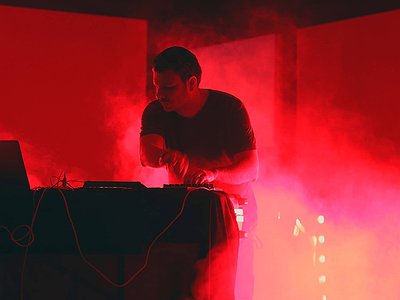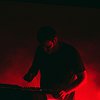Could you describe your creative process on the basis of a piece or album that's particularly dear to you, please? Where did the ideas come from, how were they transformed in your mind, what did you start with and how do you refine these beginnings into the finished work of art?
Certainly. Myalbum Sarava Exu’ is a good example. I had done three records prior on Digitalis, all based on these beatless trance constructions – I knew I had taken that music to its ultimate conclusion and wanted to move in a new direction that incorporated things from my past that I hadn’t utilized in many years, such as noise, string instrumentation, percussion, sampling. I spent more time researching for this record, learning and playing condomble rhythms and percussion and learning about Quimbanda and the rituals of the cult than I did writing the music. Once something moves you, the framework starts to build itself, you begin to assign things; ideas to notes or phrases, atmospheres to text and it really begins to grow organically. I could write a novel on this record and all its little intricacies, the meaning behind each word and sound and what it means to me. Ultimately though, once its done the only thing that matters is what it could mean for someone else. There is a very gracious writing on this record written by Chris Redfearn here if you are interested.
There are many descriptions of the ideal state of mind for being creative. What is it like for you? What supports this ideal state of mind and what are distractions? Are there strategies to enter into this state more easily?
Ideal state of mind would be a flow state – being fully immersed in a feeling of energized focus, full involvement, and enjoyment in the process of writing. I think the resulting loss in the sense of space and time is fruitful. I have limited as many distractions as I can to get there, and continue to do so, but it’s a constant challenge.
How is playing live and writing music in the studio connected? What do you achieve and draw from each experience personally? How do you see the relationship between improvisation and composition in this regard?
There is very little improvisation involved in anything I do these days. The studio is my main habitat – I do love playing live, and the goal for me is the same as the writing. To have a meaningful experience, something that has a narrative and works on multiple levels. I like my records to wring you through hell and back and I try and have the live shows replicate that emotional variance as well, moving through a spectrum of emotion. Fear, anger, melancholy, joy & beauty.
How do you see the relationship between the 'sound' aspects of music and the 'composition' aspects? How do you work with sound and timbre to meet certain production ideas and in which way can certain sounds already take on compositional qualities?
Compositional qualities come in arrangement, form, orchestration, sequencing, motifs, themes, subtext, etc. Sound is everything else. Organizing the sounds in a specific way completes the composition. I am much more interested personally in compositional strategies than I am with sound.
Our sense of hearing shares intriguing connections to other senses. From your experience, what are some of the most inspiring overlaps between different senses - and what do they tell us about the way our senses work? What happens to sound at its outermost borders?
Great question. I am always amazed at how music can elicit an emotional response, this has been an interest of mine forever. I do write film music on occasion, it’s an incredibly powerful paradigm. Why is it that when watching a film the casual viewer can absorb dissonance and dense chords but when you remove the image it becomes cacophony? For many years I tried to create music with no emotional context; as an improviser I was stabbing floor toms with forks and crackling rosin sounds on drum heads with contact mics – all in search of making sound that is not emotional. I came to realize, every strike of my fork or finger move had emotion coursing through it. From then on I’ve embraced ‘drama’ in my music and continue to try and elevate the emotional responses it could elicit.
Art can be a purpose in its own right, but it can also directly feed back into everyday life, take on a social and political role and lead to more engagement. Can you describe your approach to art and being an artist?
I’ve never thought of myself as an artist, the word feels slimy to me and deceitful. I am a musician. As a musician, my primary function and approach is to allow and create space for the writing process to be a launchpad for self-exploration. That is it. Dick Grove, a well-known music educator in LA, used to say:
“We all think we’re writing music to make money, or to move people, but what we’re really doing, if we just take a look, is finding out about ourselves”.
When we sit down to write music, many things about ourselves come into play, front and center: How disciplined am I? How much do I trust my ability? Is this shit any good? How much do I believe in myself? Am I actually enjoying writing music, or having fun? Or is it a chore?
I think the wrestling of these voices is where the gold is.
It is remarkable, in a way, that we have arrived in the 21st century with the basic concept of music still intact. Do you have a vision of music, an idea of what music could be beyond its current form?
I think music will be just advertisements eventually like in that movie with Wesley Snipes I think it was? But some will push the limits and continue to expand what music is. And those people will die in obscurity.



